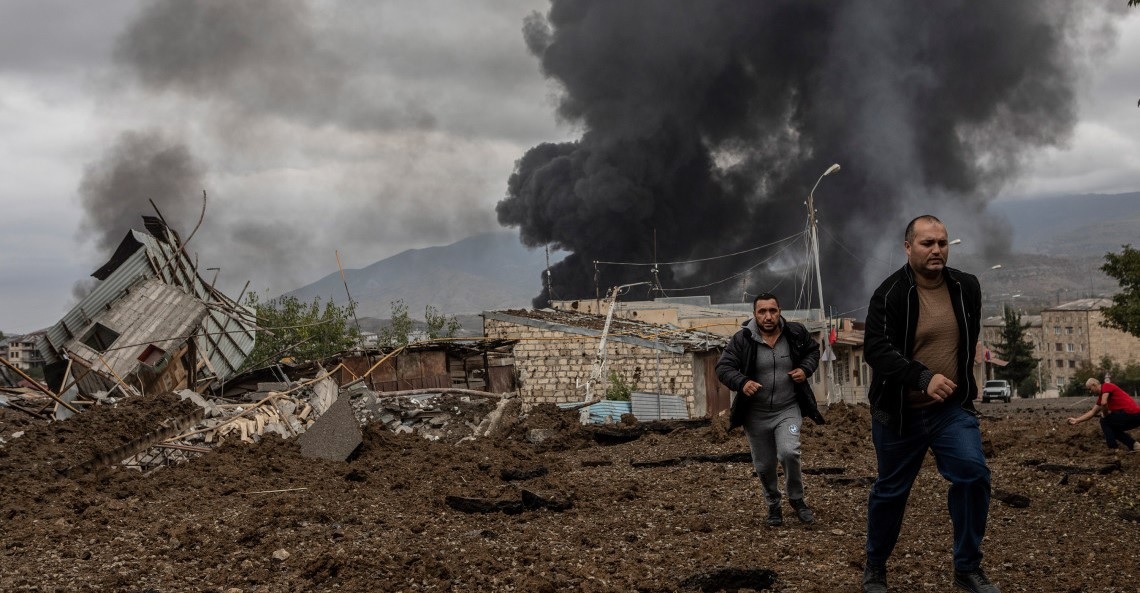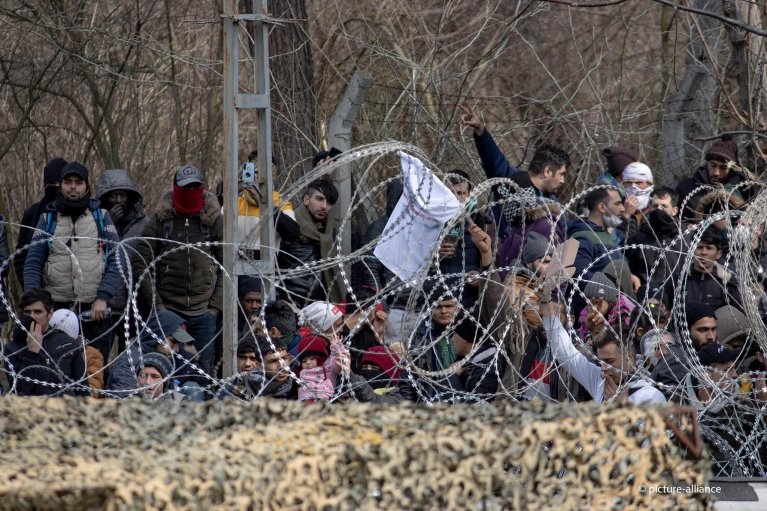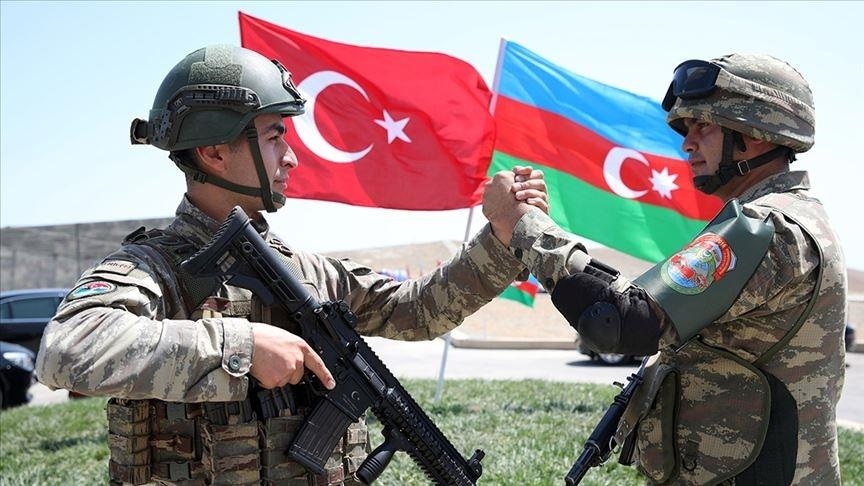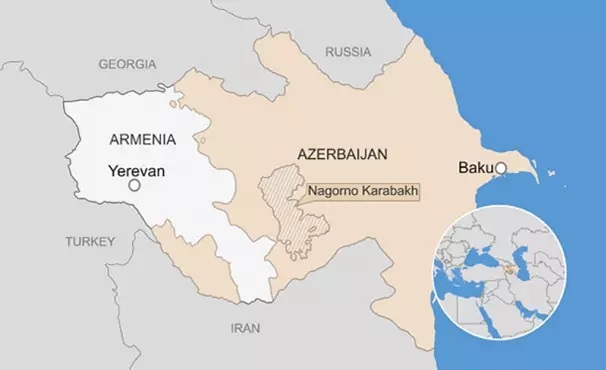
This is how politics works in European countries. In Turkey, an increasingly incompetent despotic regime, whose economic performance is catastrophic, uses blind violence to stay in power – against internal opponents, against the Kurds, and against anyone who can excite, in the most backward part of the population, the foolish faith in the idea that Erdogan’s dictatorship can rebuild the exploits of the Ottoman Empire.
That’s fine with us: Erdogan closes tens of thousands of immigrants in concentration camps (people who would like to come to Europe), remains an ally of NATO – and thus of Israel, the Egyptian dictatorship and the absolute monarchies of the Persian Gulf – and, while gritting his teeth, renounces fighting against Greece and accepts Sweden and Finland into NATO in exchange for repressing the poor Kurds in Scandinavia.
Then Erdogan becomes the statesman who negotiates with Putin and gets Ukrainian grain to feed Africa, and brings into the EU alternative gas to what we have (rightly) decided not to buy from Russia. Let’s not be difficult: Erdogan doesn’t have gas, he buys it from Putin, so that we Europeans violate the embargo we have enacted, finance the Russian army in the Donbass, and give the thirsty Turkish dictatorship badly needed money, as its domestic economy is collapsing.
Well, our ‘friend’ Erdogan has decided that this is not enough for him. It’s not enough for him that we give him money, it’s not enough for him that we betrayed the Kurds and actively participate in their persecution, it’s not enough for him that we created the conditions for a starving country to now be the arbiter of war between Russia and the US. It is not enough for them, because the discontent of the Turkish population continues to grow: just like in western democracies, if people become impoverished, they start to blame the government. In a dictatorship this is done quietly, but the anger and frustration is felt and, at the next national elections, despite the predictable fraud, could create some nasty surprises.

Tens of thousands of refugees from the Middle East, Asia and Africa live in inhuman conditions in EU-funded Turkish concentration camps[1]
So our ‘friend’ Erdogan remembered that the Turks hate Armenians. There is no longer any reason for this, especially after the Ottoman Empire, just over a century ago, tried to exterminate them all. Today, it is a dislike like between fans of football teams in the same city, or inhabitants of two contiguous suburbs equally dominated by ignorance and misery. Since the Russians and Americans have so far prevented him from using the Azeris as proxies to invade Nagorno-Karabakh, and both Trump and Putin had ordered him to stop, in the great confusion of Europe’s eastern borders he has seen fit to play the blackmail card, thanks to the arms coming from Tel Aviv: either you allow us to move the Turkish borders forward, in the direction of the Caspian Sea, or we take them by force, threatening to unleash immigrants on our borders, sinking the ships bringing grain to the Third World, and stopping giving us the gas we so urgently need to cope with the coming winter.
Erdogan is indeed one of those friends it would be better to lose – and force Turkey, as happened in the past when Ankara was dying to join the European Union to drive millions of starving citizens to emigrate – to honour its pacts and transform the open-air prison that has become that country into a more humane place. Instead, no. In the pages of the national newspapers of several countries, including Italy, the news of the umpteenth Turkish and Azeri attack against Armenia is silenced, or hidden in the inside pages that no one reads, and on which governments take no position.
The facts

The armed forces of Azerbaijan bombed the Armenian towns of Goris, Sotk and Jermuk with drones and howitzers[2], and the Armenian army mourned at least 49 soldiers[3]. The Azerbaijani Defence Ministry accused the Armenian forces of ‘large-scale subversive acts’[4] and of firing small arms in the directions of the settlement of Novoivanovka (in the Gadabay region), and the settlement of Husulu (in the Lachin region), close to the border between the two countries. In a statement to the press, Armenian Prime Minister Nikol Pashinyan accuses Azerbaijan of attacking Armenian cities because it refuses to negotiate over Nagorno-Karabakh, the enclave that lies within Azerbaijan and is mainly populated by Armenians[5]. In fact, the hostilities are long-standing, and relations between the two countries have long been complicated.
Diplomacy was immediately set in motion: the US Secretary of State, Antony Blinken, let it be known that ‘we urge an immediate end to all military hostilities’ and contacted his Armenian counterpart, agreeing to take measures to stabilise the situation at the border; the Turkish Foreign Minister, Mevlut Cavusoglu, called his Azerbaijani counterpart, Jeyhun Bayramov, while asking Armenia to ‘cease provocations’. Charles Michel, President of the European Council, urged Pashinyan to prevent further escalation[6]. Iran, too, was seriously concerned and asked the parties for ‘restraint’[7]. The Russian Foreign Ministry brokered a cease-fire, saying it expected both sides to abide by the terms of the agreement; however, after a quarter of an hour, agencies report, the truce broke down[8]. Pashinyan reported that the intensity of the fighting was decreasing but that firing was still taking place[9].
Nagorno-Karabakh is a melting pot of cultures, religions and ethnicities, and the name reflects this: Nagorno means ‘mountainous’ in Russian, Kara means ‘black’ in Turkish, and Bakh means ‘garden’ in Parsi. It is a Christian enclave in Muslim Azerbaijan, which covers an area of about 4400 km2 in a mountainous area in the south-eastern Caucasus and whose capital is Stepanakert. During the conquest of the region, the USSR used the Karabakh issue opportunistically, sometimes supporting Azerbaijan, sometimes Armenia, according to strategic convenience. In 1921, when the Sovietisation of the region was complete, the Karabakh issue remained unresolved: it was decided to leave it under Azerbaijani control on condition that it had autonomous status, a solution that satisfied neither side[10]. Instability reigns supreme.
In 1988, the Armenians living in the enclave demanded the transfer of what was then the Nagorno-Karabakh Autonomous Oblast (NKAO) from Soviet Azerbaijan to Armenia; with the collapse of the Soviet Union, tensions turned into a full-blown war[11]. The conflict broke out in 1991: the Armenian army occupied Nagorno-Karabakh, a territory internationally recognised as part of Azerbaijan[12]. The fighting, which caused at least 30,000 deaths and over a million displaced persons, ended with an agreement brokered by Russi[13].
From 1994 to 2020, intermittent attacks cause hundreds of deaths, the tension remains at an alarming level, until on 27 September 2020, the war resumes[14]. The Azerbaijani army liberates several cities and more than 300 settlements and villages occupied by Armenia[15] thanks to the enormous Azerbaijani war superiority: Turkey provides them with sophisticated and expensive weapons, such as the Bayraktar TB2 combat drones carrying laser-guided bombs already tested in Syria and Libya; these are joined by the Israeli UAV Heron and Hermes reconnaissance drones, and finally also the ‘kamikaze’ Orbiter drones, also made in Israel[16]. Armenian officials claim that Turkey has deployed thousands of ‘mercenaries’ recruited in Syria, allegations denied by Ankara and Baku[17].

More than 7,000 military personnel and about 170 civilians died, then Russia stopped them all, on 10 November, with an agreement handing back the seven districts of Nagorno-Karabakh to Azerbaijan: but the soldiers of both armies are left looking at each other in a scowl within 100 metres of each other. Russian peacekeeping outposts are deployed along the main roads, in areas populated by Armenians, and the main traffic artery between Armenia and Nagorno-Karabakh, even within the Lachin corridor, is a veritable powder keg[18].
Today, once again, Nagorno-Karabakh is in flames, in a framework in which Russia is suffering the Ukrainian counteroffensive. Erdogan has managed to block efforts for a reconciliation agreement. This time Putin has neither time nor will to intervene, and the EU is silent. For our citizens, this is fine. We have no desire for awareness, but for illogical glee.
[1] https://www.infomigrants.net/en/post/29205/eu-concludes-%E2%82%AC6-billion-contract-for-refugees-in-turkey
[2] https://www.azatutyun.am/a/32030456.html
[3] https://www.aljazeera.com/news/liveblog/2022/9/13/live-deadly-fighting-erupts-over-nagorno-karabakh-tensions
[4] https://www.aljazeera.com/news/2022/9/13/deadly-clashes-erupt-between-armenia-azerbaijan
[5] https://www.cnbc.com/2022/09/13/armenias-pm-says-49-soldiers-died-in-clashes-with-azerbaijan.html
[6] https://www.reuters.com/world/armenian-russian-defence-ministers-discuss-nagorno-karabakh-after-flare-up-2022-09-13/
[7] https://www.aljazeera.com/news/liveblog/2022/9/13/live-deadly-fighting-erupts-over-nagorno-karabakh-tensions
[8] https://www.aljazeera.com/news/2022/9/13/deadly-clashes-erupt-between-armenia-azerbaijan
[9] https://www.aljazeera.com/news/liveblog/2022/9/13/live-deadly-fighting-erupts-over-nagorno-karabakh-tensions
[10] https://www.jstor.org/stable/41478346 “Why autonomy? The making of the autonomous region of Nagorno-Karabakh 1918-1925” – Arsene Saparov – 2012 – Taylor & Francis, Ltd
[11] https://www.jstor.org/stable/41478346 “Why autonomy? The making of the autonomous region of Nagorno-Karabakh 1918-1925” – Arsene Saparov – 2012 – Taylor & Francis, Ltd
[12] https://www.aa.com.tr/en/asia-pacific/amid-armenian-provocations-azerbaijans-president-meets-with-armed-forces-commanders/2684309
[13] https://www.globalr2p.org/countries/nagorno-karabakh-azerbaijan-armenia/
[14] https://www.crisisgroup.org/content/nagorno-karabakh-conflict-visual-explainer
[15] https://www.trtworld.com/asia/dozens-of-azerbaijani-soldiers-killed-in-border-provocations-by-armenia-60749
[16] https://www.aljazeera.com/news/2020/12/22/nagorno-karabakh-how-did-azerbaijan-triumph-over-armenia
[17] https://www.aljazeera.com/news/2020/12/22/nagorno-karabakh-how-did-azerbaijan-triumph-over-armenia
[18] https://www.crisisgroup.org/content/nagorno-karabakh-conflict-visual-explainer
Leave a Reply